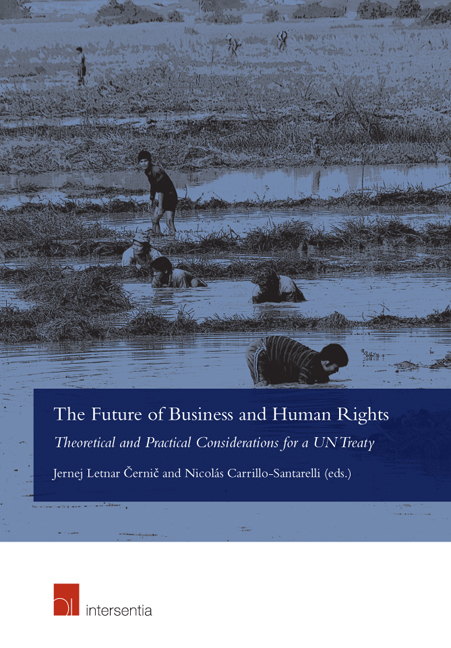Book contents
- Frontmatter
- Dedication
- Acknowledgements
- Contents
- About the Contributors
- Introduction
- Part I The Convenience and Possibility of Adopting a Treaty on Business and Human Rights
- Part II Critical Analyses Of A Treaty On Business And Human Rights
- Part III Regional Approaches
- PART IV Lessons from other Regimes of International Law
- A Convention or a Recommendation? The Experience of International Labour Legislation
- Lessons for the Treaty Process from the International Law Commission and International Environmental Law
- Conclusion
- Index
Lessons for the Treaty Process from the International Law Commission and International Environmental Law
from PART IV - Lessons from other Regimes of International Law
Published online by Cambridge University Press: 11 October 2018
- Frontmatter
- Dedication
- Acknowledgements
- Contents
- About the Contributors
- Introduction
- Part I The Convenience and Possibility of Adopting a Treaty on Business and Human Rights
- Part II Critical Analyses Of A Treaty On Business And Human Rights
- Part III Regional Approaches
- PART IV Lessons from other Regimes of International Law
- A Convention or a Recommendation? The Experience of International Labour Legislation
- Lessons for the Treaty Process from the International Law Commission and International Environmental Law
- Conclusion
- Index
Summary
INTRODUCTION
In March 2014 Amnesty International published Injustice Incorporated: Corporate Abuses and the Human Rights to Remedy. Injustice Incorporated details four case studies described by Amnesty as ‘emblematic’ for the way in which they demonstrate how ‘corporate political and financial power intertwined with specific legal obstacles … allow companies to evade accountability and deny, or severely curtail, remedy’. Injustice Incorporated concludes with recommendations for legal reform, yet does not call for a ‘binding international treaty’ as a necessary mechanism for implementation of the reforms. Instead, recommendations are focused upon measures that could be implemented through state practice, whether of legislatures or courts. Yet Amnesty, together with many other civil society groups and states of the Global South, have thrown their support behind the negotiation of a ‘binding’ treaty in the business and human rights context.
Drawing upon the case studies presented in Injustice Incorporated, this chapter will examine the treaty debate through the lens of international environmental law, with attention to the work of the International Law Commission (ILC). Amnesty highlights that the chosen case studies have in common a wide-ranging and, at most, only partially successful search for remedy and justice over many years and in many fora. Also notable, but not explicitly identified by Amnesty, is that each case study may be characterised as an example of transnational environmental harm with corporate power of a rich country externalising environmental costs to a poor one – whether, as in the first three cases, by transfer of potentially hazardous industrial technologies through foreign direct investment, or, in the fourth case, the physical transfer of hazardous waste. Thus, all involve environmental harm with associated violations of human rights. This is important as Ecuador, a key player in the push towards a binding treaty, is known for the notorious and never-ending Chevron-Ecuador oil pollution dispute – another environmental case. Moreover, Kiobel, the case that led to the decision emanating from the United States Supreme Court limiting the application of the Alien Tort Statute by US courts to cases that do not violate the ‘presumption against extraterritoriality’, may be seen as arising out of an effort to seek justice for the deaths of environmental activists voicing concerns over oil pollution on Ogoni lands in Nigeria.
- Type
- Chapter
- Information
- The Future of Business and Human RightsTheoretical and Practical Considerations for a UN Treaty, pp. 273 - 298Publisher: IntersentiaPrint publication year: 2018



